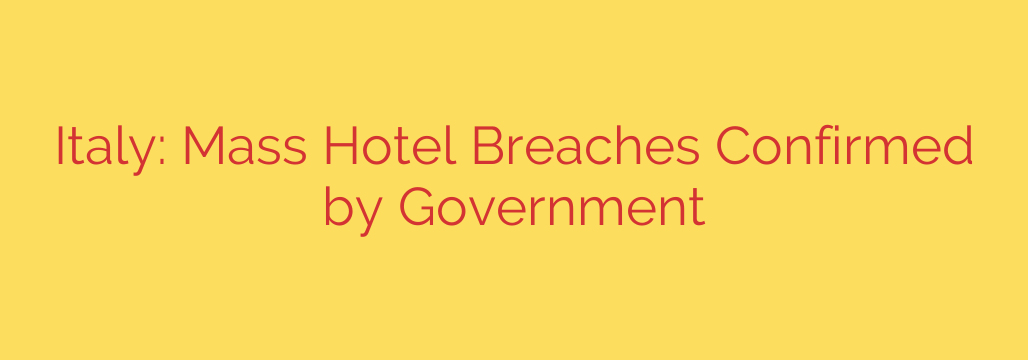
Massive Data Breach Hits Italian Hotels: How to Protect Your Information
A dream trip to Italy could turn into a financial nightmare if you’re not careful. The Italian Data Protection Authority (Garante) has issued a serious warning about a widespread and coordinated cyberattack targeting hotels across the country. This sophisticated campaign is putting the personal and financial data of countless travelers at risk.
This isn’t a small-scale issue; it’s a massive, ongoing security breach. Hackers are using advanced malware to infiltrate hotel management systems, leading to fraudulent communications that appear completely legitimate. If you have recently booked or are planning to book a hotel in Italy, this is information you need to know.
How the Hotel Booking Scam Works
The attack is alarmingly clever and exploits the trust between travelers and hotels. Here’s a step-by-step breakdown of how criminals are targeting guests:
Infecting the Hotel: Hackers first infect hotel computer systems with malicious software, often an “infostealer” or keylogger. This malware is specifically designed to find and steal login credentials for hotel booking portals like Booking.com, Expedia, and others.
Hijacking the Account: Once they have the username and password, the attackers gain access to the hotel’s official account on these booking platforms. From here, they can view all guest information, including names, stay dates, and contact details.
The Phishing Attack: Posing as the hotel, the hackers then use the platform’s official messaging system to contact guests. They typically send an urgent message claiming there was a problem with the guest’s payment. Common tactics include stating the credit card was declined or that payment verification is needed to secure the reservation.
Stealing Your Data: The message contains a link to a fake payment page designed to look identical to the real booking site. Unsuspecting travelers, fearing the loss of their reservation, enter their credit card details—including the number, expiration date, and CVV code—which are sent directly to the criminals.
Because these fraudulent messages come through the official booking app or website, they are incredibly convincing and bypass many typical spam filters.
Actionable Security Tips for All Travelers
The confirmation of this large-scale breach means travelers must be more vigilant than ever. Whether you’re booking a stay in Italy or anywhere else, these security practices can help protect you from scams.
- Verify All Urgent Payment Requests: Be extremely suspicious of any unsolicited message—email, text, or in-app—demanding immediate payment or financial information. Legitimate hotels rarely ask for payment details outside of the official, secure booking process. If you receive such a message, do not click any links.
- Contact the Hotel Directly: If you have any doubts about a message, find the hotel’s official phone number from their website (not from the suspicious message) and call them to verify the request.
- Scrutinize Links Before Clicking: Hover your mouse over any link to see the destination URL. Look for spelling errors or unusual domain names. The safest approach is to avoid clicking links in messages altogether. Instead, log in to your booking account directly through your browser or the official app to check your reservation status.
- Use Secure Payment Methods: Whenever possible, use a credit card for online bookings rather than a debit card. Credit cards generally offer stronger fraud protection and limit your liability. Consider using a virtual credit card number for one-time use if your bank offers this service.
- Enable Two-Factor Authentication (2FA): Secure your personal booking accounts by enabling 2FA. This adds an extra layer of security, making it much harder for anyone to access your account even if they steal your password.
A Critical Reminder for the Hospitality Industry
This campaign also serves as a stark reminder for hotel operators about the importance of cybersecurity. Hotels must prioritize the protection of their systems by:
- Implementing robust antivirus and anti-malware solutions.
- Enforcing strong, unique passwords and mandating two-factor authentication for all accounts, especially booking portals.
- Training staff to recognize and report phishing attempts and suspicious activity.
As travel becomes increasingly digital, both consumers and businesses must adapt to the evolving threat landscape. By staying informed and practicing good digital hygiene, you can ensure your vacation remains a relaxing getaway, not a data security crisis.
Source: https://go.theregister.com/feed/www.theregister.com/2025/08/14/italian_hotels_breached_en_masse/








